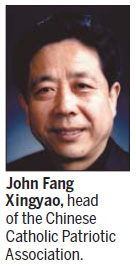Society
Approval of bishops 'a priority'
By Zhao Yinan (China Daily)
Updated: 2011-04-11 07:24
 |
Large Medium Small |
BEIJING - A total of 11 dioceses are awaiting approval of their elected spiritual leaders amid efforts by Chinese Catholics to fill a vacuum of bishops in almost half of the Chinese dioceses, a leading bishop said.

Bishop John Fang Xingyao, chairman of the Chinese Catholic Patriotic Association (CCPA), said that 44 out of 97 Catholic dioceses on the Chinese mainland currently do not have a bishop, which has hindered the spreading of the Gospel for the estimated 6 million believers in China.
"The election of bishops and their consecration are the top priorities. We encourage the 44 dioceses to elect their spiritual leaders if the situation permits," he told China Daily in an exclusive interview.
Fang, 57, bishop of Linyi diocese in East China's Shandong province, was elected chairman of the CCPA at the 8th National Congress of Chinese Catholics in December.
The conference also saw the election of Joseph Ma Yinglin, bishop of the diocese of Kunming, capital of Southwest China's Yunnan province, as head of the Bishops' Conference of the Catholic Church in China (BCCCC).
The number of Chinese Catholics has surged by a million over the past decade, according to CCPA statistics.
Nearly 300 Catholic churches were built across the country from 2004 to 2010, taking their number to about 6,300, the CCPA said.
However, despite the statistics, Catholicism in China is challenged by a shortage of bishops and priests.
More than 3,300 members of the Catholic Church, including bishops, priests and deacons, were working across the 97 dioceses at the end of 2009, according to an Annual Report on China's Religions (2010) published by the Chinese Academy of Social Sciences.
Fang admitted that the consecration of bishops is facing many obstacles.
"In some dioceses, it would be premature to carry out consecrations, while in others there is a shortage of candidates or the candidates are still not qualified," he said.
The standard procedure to elect a bishop in China stipulates that candidates must be more than 35 and have worked for at least five years after being ordained a priest.
Besides, the candidate is also required to "love the country and the Church", apart from being proficient in religious studies and respected among the laity.
Fang said dioceses without bishops can hold a ballot after approval from the provincial administrative commission of the Chinese Catholic Church.
The result of the election is only valid if the candidate receives more than half of the votes and wins approval from the BCCCC. The consecration will then be held within three months after receiving approval.
Chinese Catholics have been adhering to the principle of independent selection and consecration of bishops since 1958 when they cut economic and political relations with the Vatican.
| 分享按鈕 |